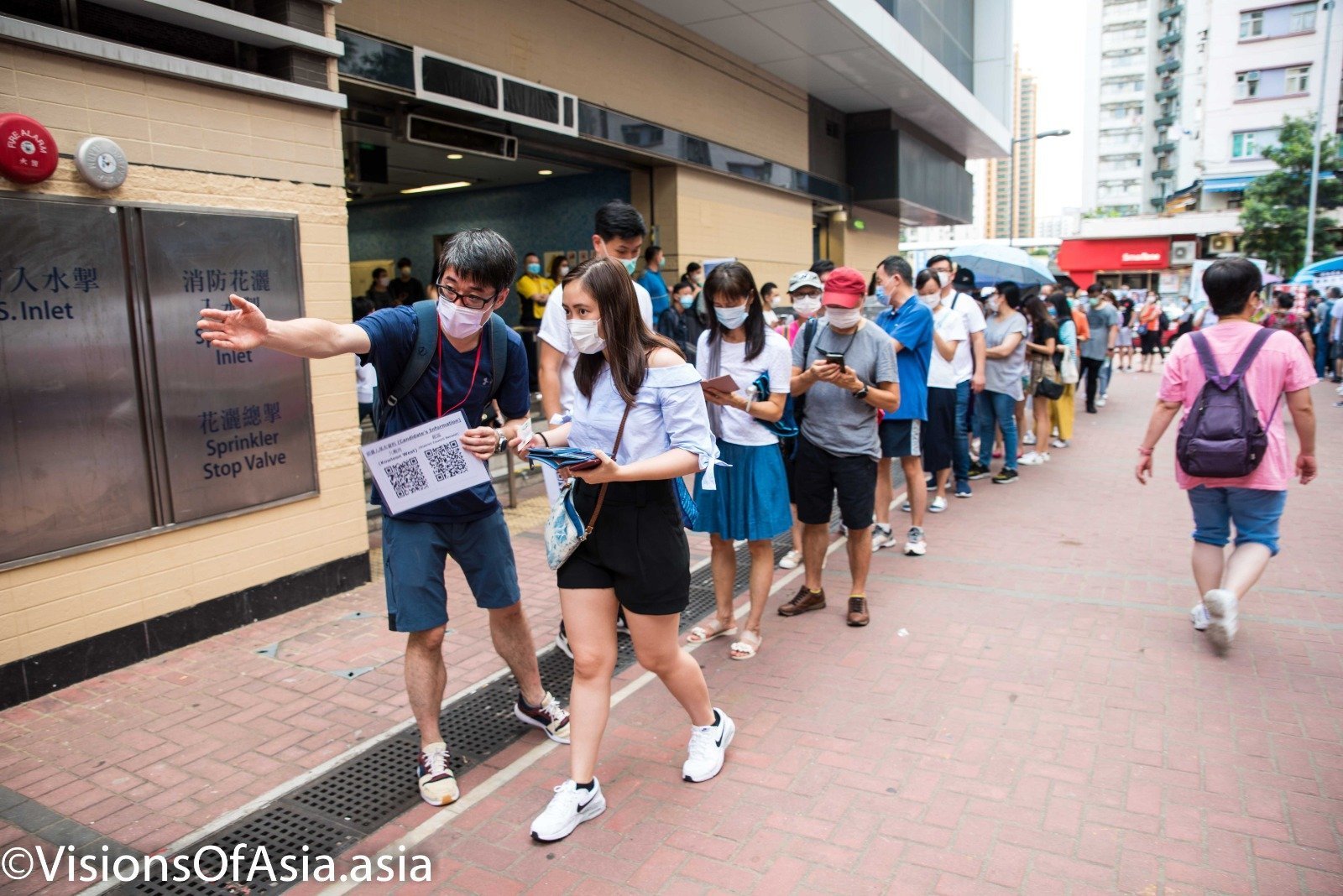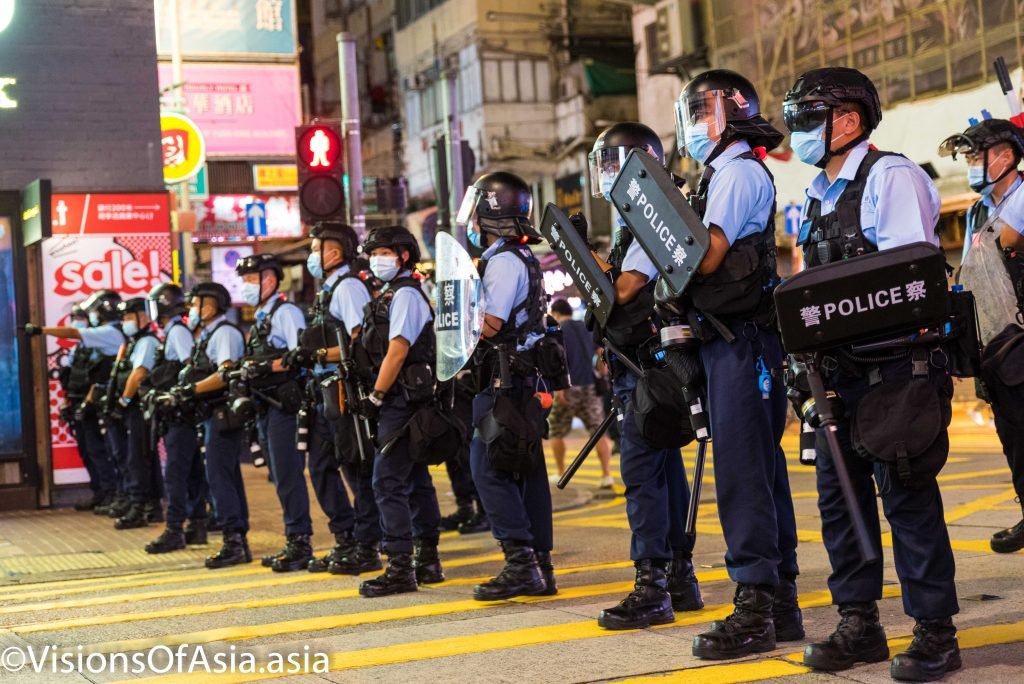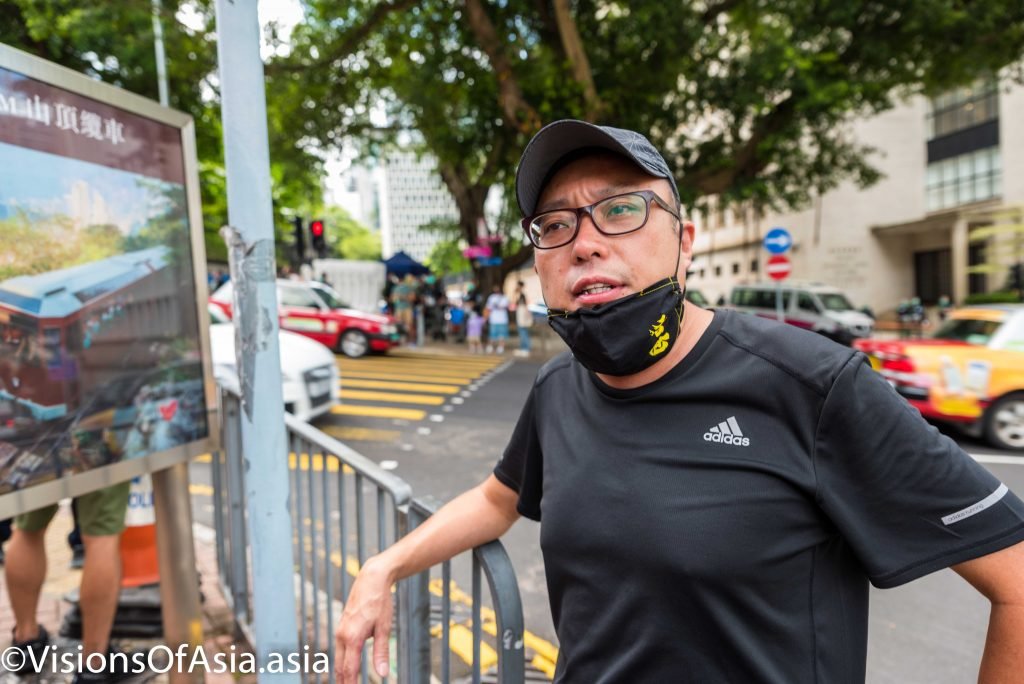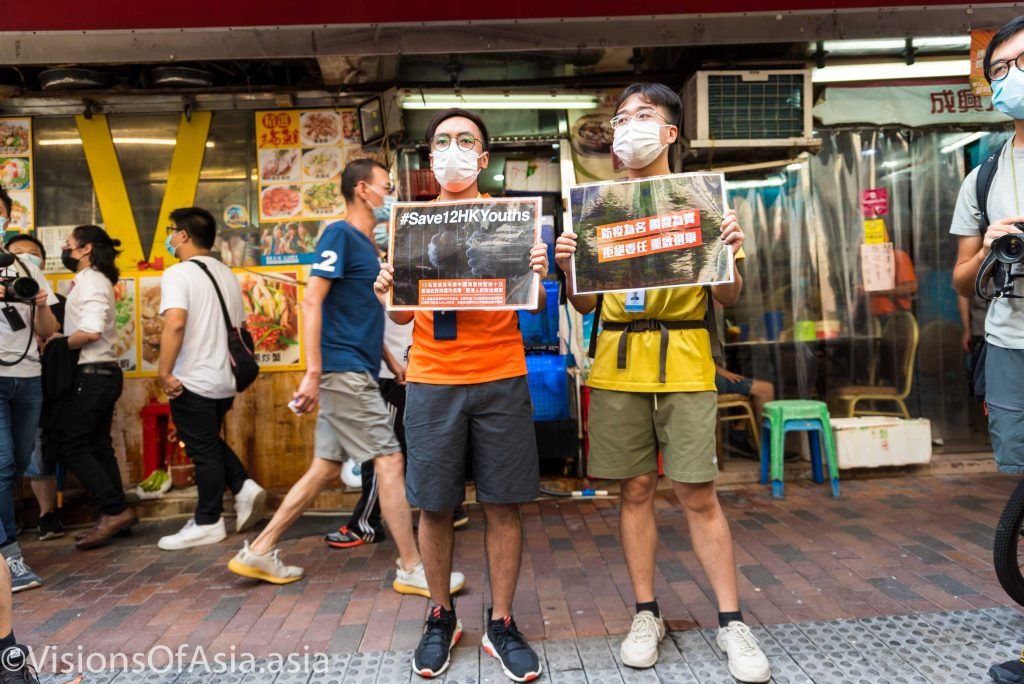After passing the National Security Law, on July 1st, China set out to radically transform the political landscape of Hong Kong. Although many hailed the law as the death knell for Hong Kong, it appears today that it was only the prelude and the mechanism by which to inflict “death by a thousand cuts” for Hong Kong.
The continuous self-censorship
Since July, protesters who claimed being “ready to die” in 2019 became strangely discrete. For some reason, people who were claiming readiness to sacrifice lives and well-being for the cause became suddenly extremely careful, testing the limits of what would get them in trouble, such as non-written or unrecognizable signs. It went even up to showing an apple during a protest on the arrest of Jimmy Lai, the owner of Apple Daily.

Protesters tried nevertheless to convey their protest through various means. Like just holding a newspaper.
Stop or Go?
The announcement by Carrie Lam of the postponement of the LegCo elections which were due to take place on September 6th this year, and the further extension of the mandate of the current LegCo by the National People’s Congress, in Beijing, placed the Democrats in a quandary.
Staying was risking legitimizing the cancellation of the elections; leaving was risking leaving the whole LegCo in the hands of Beijing, with no way to counter anything.

Despite a resounding public success for a primary election organized by the Pan-Democrat camp back in July, the Hong Kong government and China kept bidding their time for a full crackdown on the pan-democrat camp.
The start of the end: disqualifications of candidates
Quickly after the primaries took place, the Hong Kong government announced the postponement of the LegCo elections. Just prior to that, the electoral officers disqualified four candidates (who were among the sitting members of Legco) and threatened others with the same penalty for filibustering. The disqualified candidates were Alvin Yeung Ngok-kiu, Kwok Ka-ki, Dennis Kwok and Kenneth Leung. The electoral officer found they could not run as they had failed to prove their loyalty to the HK SAR and China by calling foreign nations to sanction Hong Kong.

When Beijing announced the prolongation of the current Legco for another year, the trap closed in on the Democrats. Staying was basically validating the coup de force of China, leaving was taking the risk of allowing China to force through all the most disastrous laws for public freedoms since the handover. Lack of leadership, of strategic sense and dissensions brought the Democrats to a standstill until a genius among them had to the idea to refer the issue to… “the public”! Not via a vote, but rather a “poll”.
With a population as undecided about the issue as them, the poll was not conclusive. So, the Democrats announced on 29 September 2020 that they would stay on… some even stating that they could use their Legco salary to “help” people. Two of the Democrats managed to announce they were resigning anyway (Raymond Chan and Eddie Chu).
Second “coup de force”
Alas, this was not to last. On 11 November 2020, China’s National People’s Congress Standing Committee (NPCSC) emitted another Basic Law “interpretation”. This “interpretation” stated that if a sitting legislator was disqualified from running in future elections, then his function in the current LegCo was invalidated from the moment the decision was made. The Chief Executive Carrie Lam immediately implemented the decision, announcing the disqualification of the legislators. The Basic Law foresees only limited cases where sitting legislators can be disqualified during their mandates (and one of those occurences being based on a vote of 2/3 of the LegCo).
Truth to be told, having been deprived from their power to veto any decision since 2016 and the “oathgate”, the Democrats could only filibuster against motions by the pro-China camp (among others by repeated quorum calls).
In front of this coup de force, the Democrats finally gave up on their attempts to compromise with Beijing and announced their mass resignation.

Witch Hunt
Since September, the situation had gone from bad to worst. Activists kept being arrested by the police for various “crimes”, mainly speech crimes. One famous firebrand activist, Tam Tak-Chi got arrested for violation of the National Security Law in September, namely his chanting a famous protest slogan involving the words “liberate”. His request for bail was denied, and at the time of writing this post, he is still in jail.

At the time, Tak-Chi gave us what was probably one of his last interviews, denouncing the lack of freedom in Hong Kong. As we were about to publish this post, we learned that the Department of Justice was demanding for a National Security Judge to be appointed for Tam Tak Chi.
Other arrests followed, among others those of activists who organized the Tienanmen vigil on June 4th, for “unlawful assembly”.
Leaving or leaving…
As the situation worsened day by day on the front of civil liberties in Hong Kong, for activists, the choice is summarized between leaving their ideals, or leaving the city.
Some activists, involved in judicial investigations took to the sea to escape Hong Kong towards Taiwan. They were arrested by the Chinese Coast Guard and sent to Shenzhen where they are being detained incommunicado. They became the famous “Save 12 HK” which is the latest slogan of protesters in Hong Kong. Many believe the Hong Kong government purposefully allowed them to escape for them to be captured, despite vigorous denials by Carrie Lam and her team.

The other choices, for those who wisely did not get involved into legal proceedings were expanding. The United Kingdom announced a facilitated path to citizenship for holders of the British National Overseas passport. This passport was granted to residents of Hong Kong prior to the handover in 1997. Other countries such as Canada and Australia have also announced facilitated entry for Hongkongers fleeing their city. But as the coronavirus pandemic rages across the world, these opportunities have remained largely virtual for the time being. For now, Hong Kong is learning to live under increased scrutiny and repression. And that is truly the “death by a thousand cuts” of Hong Kong.

